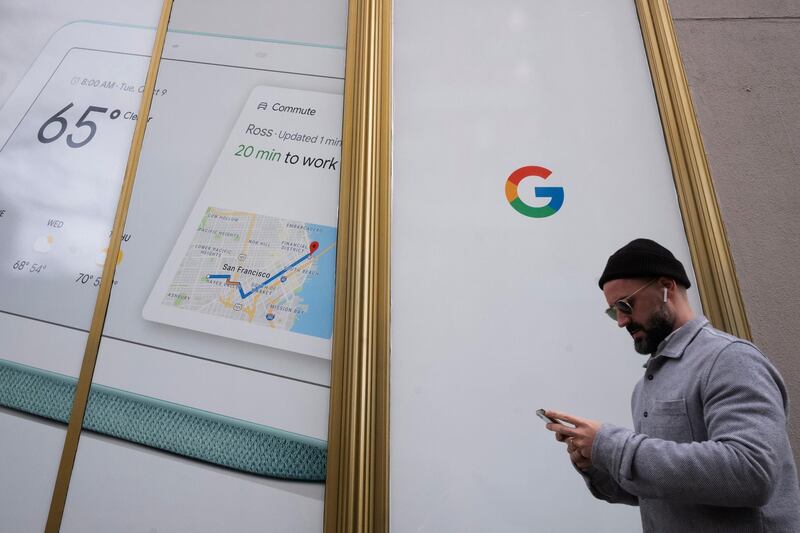Google parent Alphabet reported thinner profit margins as the internet giant spent heavily to expand its cloud and YouTube businesses. The company’s shares slipped in late trading.
Google’s fourth-quarter capital expenditures jumped 80 per cent to $6.85 billion. The company’s operating margin, a closely watched measure of profitability, was 21 per cent, down from 24 per cent.
Alphabet is relying on its ad business to support sales and profit growth as it develops new offerings such as cloud services and consumer hardware. The company’s higher-growth businesses, which also include YouTube, are less profitable than the original Google desktop search service.
"Capex is growing at a sizable clip and the primary driver continues to be investing in technical infrastructure to support growth," Alphabet chief financial officer Ruth Porat said in an interview. "By that we mean data centres and machines. This reflects our outlook for global growth in ads, search, YouTube and cloud."
Costs were also pushed higher by hiring, mostly for the cloud business, she added during a conference call with analysts. Alphabet had 98,771 employees at the end of 2018, up 23 per cent from a year earlier. Ms Porat said headcount growth should moderate in 2019.
The company also spent heavily on YouTube, which shares a lot of its ad revenue with content creators and larger media partners.
Google is asking investors to trust that investments in future growth will pay off, but the company discloses limited financial details on its newer initiatives. YouTube numbers are buried inside Google, while cloud and hardware results are part of Google’s Other revenues line.
"If Google really wants to see more of a sum-of-its-parts valuation from investors, they’re going to have to start disclosing," Aaron Kessler, an analyst at Raymond James, said.
Alphabet shares declined 3 per cent in extended trading. Earlier, they closed at $1,141.42 in regular New York trading. The stock has gained 9.2 per cent so far this year.
Fourth-quarter sales, minus fees paid to partners, climbed 23 per cent to $31.84 billion, the internet giant said in a statement Monday. Analysts on average were expecting $31.33bn, according to data compiled by Bloomberg. Net income was $12.77 a share, compared with a loss of $4.35 a share a year earlier, when a one-time tax expense wiped out profit.
Online commerce grew quickly in the final quarter of 2018, helping Google’s ad business. When shoppers hunt for holiday gifts, they often use Google’s search engine, letting the company send them targeted product ads based on those queries. The number of clicks on ads that Google ran on its own services surged 66 per cent in the fourth quarter, versus the 2017 holiday period.
Sales growth of 23 per cent "is very good for what is viewed as a mature business," said Christopher Rossbach, chief investment officer of private investment office J. Stern & Co. "We are confident that Google will continue to have rising paid click volumes for the foreseeable future."
The company’s ad business is built on the collection of intimate data about billions of people, a practice that’s increasingly being scrutinized. Last month, French privacy regulators fined Google €50 million ($57 million) for not giving consumers enough information when it asked them to sign over access to their information.
Still, ads from Google and rival Facebook are more relevant and effective than most other options - precisely because the companies collect so much information on activity across the internet and beyond. New privacy rules in Europe, known as GDPR, may have limited this data harvesting slightly, but that’s hit smaller competitors more than the two digital giants. Facebook results beat Wall Street estimates last week.
"We are encouraged that the GDPR regulations have improved the rights of European users whilst not having had a significant negative effect on the operations of Google," Rossbach said. "The fundamentals of their advertising business remain intact."
He’s happy Google is spending heavily on YouTube, cloud and hardware. The investor is also bullish about Waymo, Alphabet’s autonomous vehicle unit.
Revenue from Google’s Other division, which includes cloud and hardware, rose 31 per cent to $6.49bn. Chief executive Sundar Pichai said the cloud operation is "getting large wins", and Ms Porat noted that it’s one of the fastest-growing businesses at Alphabet.
Other Bets, which include Waymo, generated revenue of $154 million, up 18 per cent from a year earlier. Operating losses were $1.33bn. Ms Porat said Waymo is having conversations with "a number of cities" about a driverless car service. Right now, there’s a limited paid service in the Phoenix area.
Alphabet’s cash and other short-term holdings totaled $109.14bn at the end of 2018. The company is spending some of that on buying back an additional $12.5bn of its Class C shares.
The cash hoard has also sparked speculation among some analysts that Alphabet will make a major acquisition to boost its cloud business.
"Acquisitions are an attractive complement to what we do to drive organic growth,” Ms Porat said on Monday. “We did more last year than prior, but they were small. We are very open to acquisitions."







